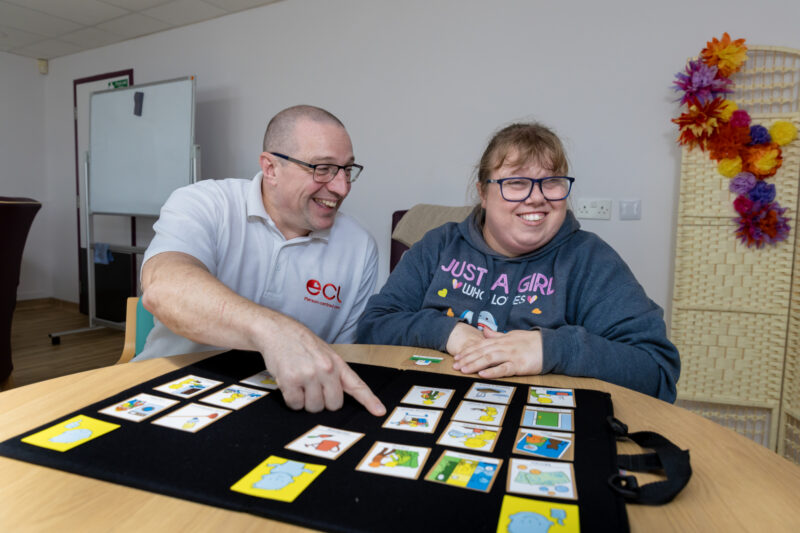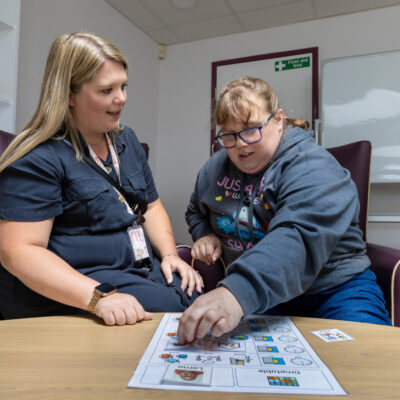Making Real Change Through Positive Behaviour Support
When 36-year-old Lorna joined ECL Basildon (also known as Ashleigh) in November 2023, she brought with her a big personality. Bubbly, kind and helpful, with a sharp sense of humour, Lorna also has autism and a learning disability. She had previously lived in Suffolk, where she was settled and happy at her local day centre. However, moving to Essex proved to be a difficult transition, and after trying several other centres, Lorna still hadn’t found the right fit—until she arrived at ECL.

Initially, things seemed to be going well. Lorna appeared happy and engaged. But after a few months, staff noticed a change—her behaviour began to shift, and there were signs she was struggling. The team reached out to ECL’s Positive Behaviour Support Advisor, David Hitchin, to help them understand the reasons behind the change in Lorna’s behaviour and develop an action plan to improve her situation.
David took the time to observe and get to know Lorna. He carried out an assessment to understand what might be triggering her behaviours, and more importantly, what those behaviours were trying to communicate. He soon identified that Lorna’s difficulties often surfaced when she couldn’t access something she wanted—like a favourite food or activity. With unclear allergy information adding an extra layer of frustration, it became evident that Lorna felt excluded and misunderstood.
David also noticed patterns in Lorna’s relationships. She loves to chat and joke with those around her, but she could sometimes become possessive of certain staff or peers. Her strong desire to be included and feel connected meant she could misread situations, especially if she felt others were receiving more attention. One peer in particular, a wheelchair user, became a point of tension, as Lorna struggled with feelings of jealousy around the support he received.
To help Lorna communicate her feelings and preferences more clearly, David used a Talking Mat, a tool that uses pictures to help people express what they think and feel. Through this, Lorna shared her likes, dislikes, and worries. The activity provided her with a structured way to be heard and helped the team understand how they could support her more effectively. It also confirmed what David had suspected: Lorna didn’t feel listened to.
David listened patiently and without judgement. He let Lorna lead the conversation and accepted her words at face value. In doing so, he built a trusting relationship with her and then shared that learning with the wider staff team. He coached them to adjust their language and approach, giving Lorna space to express herself without being corrected or dismissed. Slowly but surely, Lorna began to trust the people around her.
A breakthrough moment came after one of her sessions with David, when Lorna went home and told her mum, “I’ve got to change, I’m worried about how people see me.” It was a turning point. The next day, she made a hot drink for the peer she’d previously clashed with—a small gesture, but a huge sign of progress. Since then, their relationship has grown, and Lorna’s social awareness has made significant strides forward.
David worked closely with the ECL Basildon team to put a positive behaviour plan in place. The day centre team acted on David’s advice swiftly, implementing changes to strengthen their relationship with Lorna and support her interactions with other customers. They introduced more choice into her daily activities, used visual timetables, communicated routine changes clearly, and reduced potential triggers. These adjustments gave Lorna a greater sense of control and helped her feel genuinely heard and valued.

The impact has been clear. Lorna now enjoys stronger, more positive relationships with both staff and peers. Her confidence has grown, and there’s already a noticeable reduction in behaviours that challenge.
The team at ECL Basildon has taken the time to listen and understand Lorna. They’ve provided thorough feedback, they’re caring, and they’re willing to listen to my point of view too. The overall experience was the best. Special thanks go to the centre Lead Manager, Carla Tomasio, and Positive Behaviour Support Advisor, David Hitchin
As Lorna’s journey continues, David is gradually stepping back, confident that the ECL Basildon team is well equipped to support her day to day.
The management and support team at ECL Basildon day centre responded quickly to give her the support she needs. While I’ve been able to provide professional insights and recommendations, it’s the staff who bring them to life. They are dedicated to putting the customer at the centre of their care and have truly made a difference to Lorna.
Lorna’s story is a clear example of what can happen when people take the time to listen and work together with skill and a shared commitment to help someone thrive. It also highlights the value of having an in-house Positive Behaviour Support Specialist. David’s expertise meant that the right support could be put in place quickly, based on a clear understanding of Lorna’s unique needs. His close collaboration with staff and family ensured that change was not only possible but will continue to make a difference.